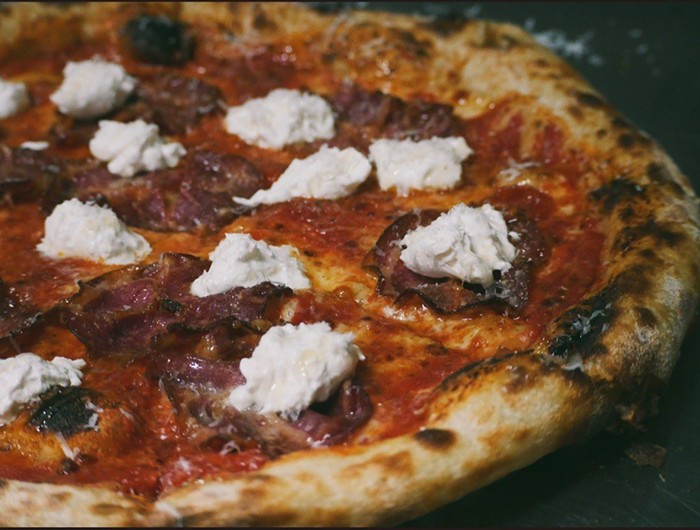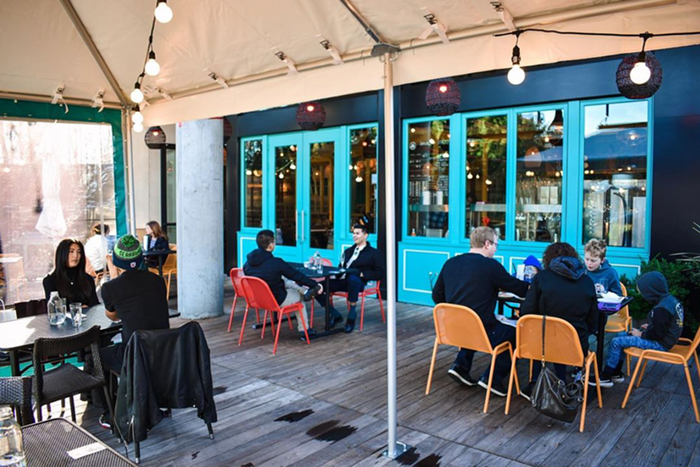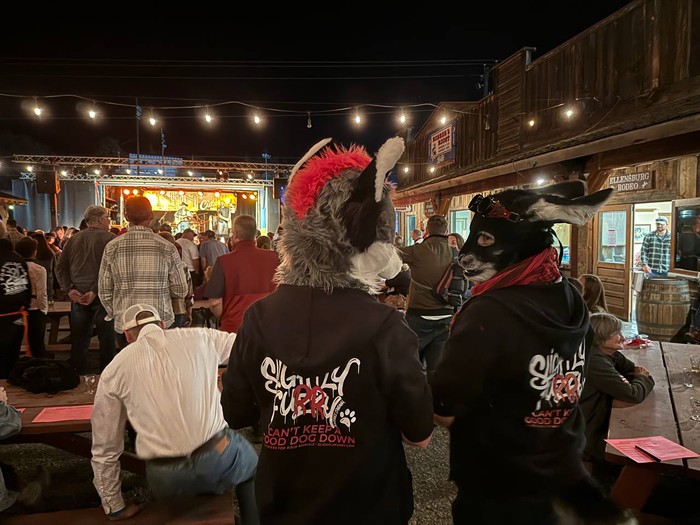I'd rather sit down to eat, honestly. I'm lazy like that. Taco trucks, hot-dog stands, and Dick's are all special-occasion dining—a special occasion known as "I'm Wasted." But on a perfectly sober afternoon, knowing that standing up to eat doesn't mean putting up with gross meat, I tracked down Seattle's two new pork-on-wheels mobiles.
Maximus Minimus is shaped like a pig. Most days, for about one month, the trailer with a snout and silver ears has served lunch from a parking lot on Second Avenue and Pike Street. You give your order to a person in front who notes on a handheld device whether you want each item maximus (made with a spicy sauce of Hefeweizen, peppers, and Lapsang Souchong smoked tea) or minimus (with a sweet sauce of tamarind).
Because I am a pig, I get both the pork sandwich and the veggie version. And perhaps because the establishment itself is a pig—making this a metapork experience—the pork (ordered maximus, $5.46) is a meal even the sacrificial swine could be proud of. Proprietor Kurt Beecher Dammeier (a partner in Sugar Mountain Group, the company responsible for Beecher's Handmade Cheese and Pasta & Co) sees that the meat is cooked for four to six hours; then the fibers render into meat threads, acting as a fine netting that suspends a faintly smoky barbecue sauce. A crisp slaw (ordered minimus) of julienned cabbage, shavings of fennel root, and bits of apple ($1.37) is on the side. All of it—including a whole-wheat bun that saturates with sauce yet magically holds its shape—is delicious.
But this truck is not shaped like a barley grain. If it were, the minimus veggie sandwich (also $5.46) might also be delicious. Instead, it is like a barley sloppy joe—a goopy maroon mess of sauce and floppy onions. The gesture of a fresh cilantro leaf on top is inadequate relief from the starch of the bun, the starch of the grains, and the cloying sauce that coats it all. The contents slip from the bread into a pile in the cardboard boat. Despite my love of veggie sandwiches—and of each ingredient contained in this one—this is a gastronomic catastrophe. Verdict: Get the pork sandwich, and pity the vegetarians in your company. Also, get the fried chips: beets, jalapeño peppers, potatoes, and carrots.
Whereas this swine truck usually remains downtown, Marination Mobile jockeys about the city like a greased hog. It was in Fremont on this particular afternoon—a Twitter feed, /curb_cuisine, helps you keep track. While the truck specializes in Hawaiian-Korean hybrid cuisine, they do not serve their signature Spam sliders in Fremont. "It's just for Capitol Hill; they can handle it," owner Kamala Saxton says. Taco-truck traditions, like corn tortillas, are given a generally elegant Korean bent, such as the kalbi beef tacos ($2), which taste like sweet bulgogi steak. Sometimes this fusion falls weird. The kimchi quesadilla ($5) is, quite honestly, one of the strangest things I've ever put in my mouth. I didn't like it, but I didn't dislike it. I ate the entire thing trying to figure out what my brain thought of kalua pork (meaty!), cheddar (cheesy!), and spiced and pickled cabbage (kimchi-y!) all happening at once. However, the aloha sliders, with thick ribbons of slow-cooked kalua pig and sliced picked jalapeños on sweet rolls, are divine. "In Hawaii, we roast the pork underground with tea leaves and hot rocks, but because of the health department, [here] we do it in the oven," says Saxton, who lived on Oahu until 14 years ago.
While the new wave of mobile food vendors continues to build loyalty—both Maximus Minimus and Marination Mobile are serving hundreds of people a day—the obstacles remain daunting. City rules require that downtown vendors park on private land (not on the street). Propane tanks quit working (which shut down Maximus Minimus the first day I tried to go). And persnickety neighbors cause problems. Marination Mobile was resonating with the masses in Capitol Hill: Three nights a week, for the truck's first three weeks in operation, long lines piled up on Broadway and East Pike Street. "Forty percent of the Capitol Hill customers are all regulars," she says—more than the truck's other parking spots in Ballard, Fremont, or Sodo. But then her landlord, the owner of the Shell station at Broadway and Pike, delivered a notice in late June. Residents and nearby business owners had complained that the truck "creates a large mass of people and the smell of food in the area," she says.
"When you have a large group of people gathering and eating outside, people think it is going to create a mess or a disturbance," Saxton says. "That is just not the case with us." She brings her own trash can, cleans up before leaving, and hauls out the garbage at the night's end. Despite having paid rent to park Thursdays through Saturdays three months in advance, Saxton is now being required by the landlord to gather signatures from every resident of the adjacent apartment building indicating agreement that the truck is not a disturbance. (This is a building overlooking a 24-hour gas station, on the same block as the frequently raucous Comet Tavern with its corner hot-dog stand.) The Shell station's owner could not be reached for comment about which businesses, exactly, have complained.
But before a truck even gets on the road or a cart gets on a corner, a Byzantine set of codes and regulations from the Washington Department of Labor & Industries and the local health department could prove insurmountable for upstart street vendors, says Saxton. For example, certain rules for electricity and plumbing are provided in industry jargon, rendering the requirements indecipherable—even to Saxton and her business partner, Roz Edison, who hold three master's degrees between them. "I'd say that L&I and the health department need to get in a room for a conversation about how to streamline the process," Saxton says. Otherwise, "some of these great chefs and cooks can't get their product to market." ![]()



















